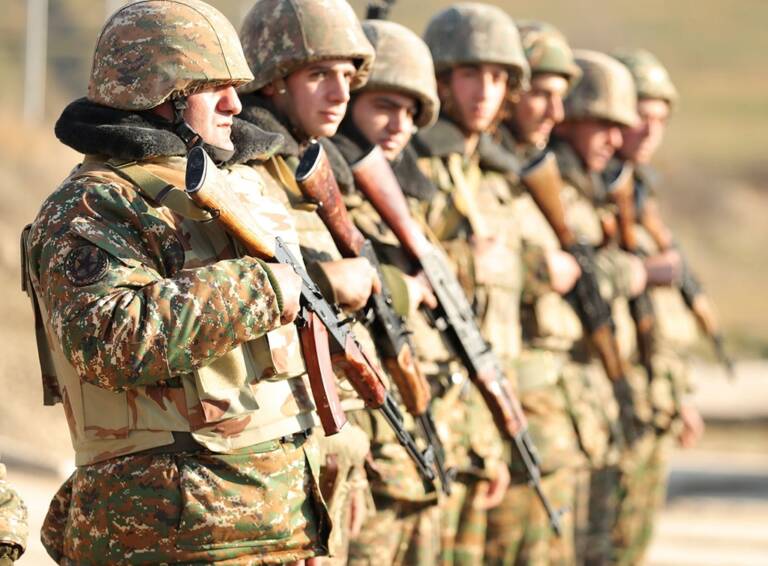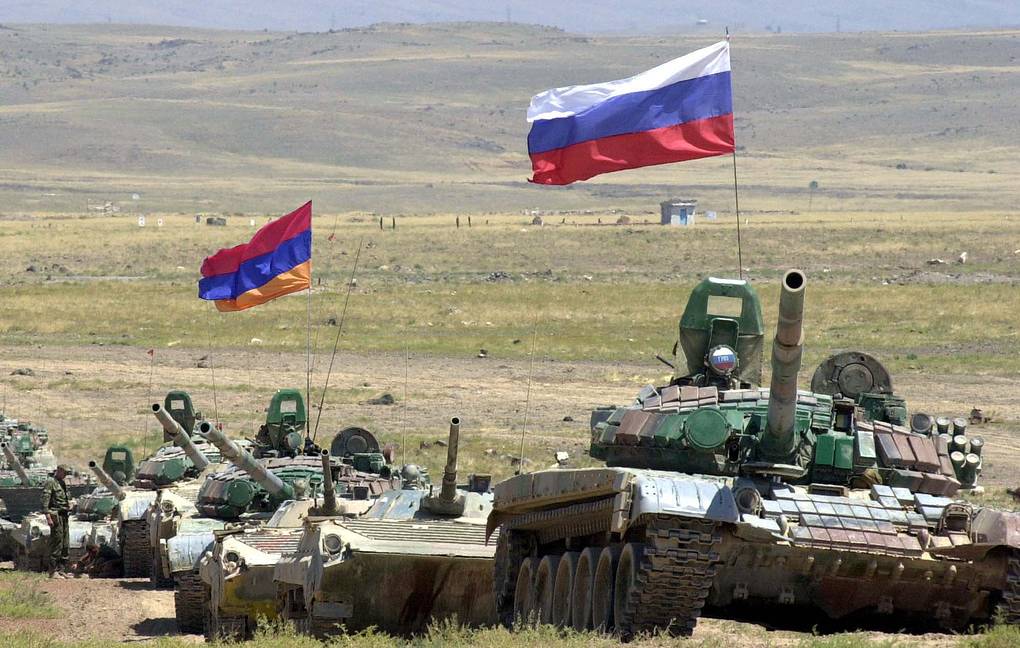Armenia would like to leave the alliance with Russia, but how?

Armenia's possible exit from the Russian-led Collective Security Treaty Organization (CSTO) is being discussed more and more actively as differences between Yerevan and Moscow grow, but exiting the deal may not be as simple as it might seem .
Many in Armenia wonder what the point is of remaining in a military alliance that has shown itself to be unwilling to protect the country.
Prime Minister Nikol Pashinyan has repeatedly denied claims, including by Russian officials, of an imminent change in Armenia's foreign policy direction, but this has not stopped speculation about how the country might leave the CSTO and about what would happen next. The representatives of the authorities themselves are reflecting on this prospect.
“There is obviously the idea of Armenia's European integration, but there is also the idea of becoming a country with non-bloc status, so there is a wide range of options. We are listening to civil society and trying to understand what are the best tools to ensure the security and development of Armenia,” Security Council Secretary Armen Grigoryan said at a forum held in Brussels on November 10 entitled “ Armenia's strategic future: Armenia-Europe.
Fifteen Armenian public organizations recently released a statement criticizing Russia for interfering in Armenia's internal affairs. The statement calls on the Armenian government to expel Russia's 102nd military base, ban Russian media outlets, and begin the process of ending the country's membership in the CSTO.
Growing dissatisfaction with Russia
The CSTO, which also includes Kazakhstan, Kyrgyzstan, Tajikistan and Belarus and is a defense alliance similar to NATO, is a major cause of growing Armenian resentment towards Russia.
The bloc, which is theoretically required to come to the aid of a member state when it is attacked, took virtually no action in September last year, when Azerbaijani troops invaded border areas and took up positions on strategic heights outside interior of Armenia.
Since then, Armenia's approach to the CSTO and Russia has been increasingly confrontational. Yerevan has reduced its participation in the bloc to the bare minimum. Over the past year, he has snubbed CSTO meetings at virtually every level and reassigned his representative in the organization to other duties, leaving his post vacant.
At the same time, Armenia welcomed closer cooperation with the EU, which earlier this year deployed a civilian monitoring mission to the border with Azerbaijan with the aim of supporting the stability of village.
This step sparked a strong negative reaction from Russian authorities, who stated that the purpose of the mission was to “geopolitically confront Russia” in the South Caucasus region.
Moscow's rhetoric has not stopped the growing cooperation between Yerevan and Brussels, including in the military sphere.
At the EU Foreign Ministers' Summit on 11 December, it was announced that the EU would examine the possibility of providing military aid to Armenia through the European Peace Facility. Furthermore, it was also announced that the EU mission in Armenia will increase the number of its observers from 138 to 209.
Another sore point for Armenia is Russia's alleged failure to deliver weapons for which Yerevan claims to have paid millions of dollars.
Armenian authorities have no intention of suing Russia and are instead seeking to resolve the issue in a “climate of cooperation,” Deputy Defense Minister Hrachya Sargsyan said in a briefing on December 4.
Prime Minister Nikol Pashinyan recently proposed resolving the dispute through Russia canceling part of Yerevan's overall debt to Moscow. The overall debt amounts to approximately $280 million, according to the latest calculations by the Armenian Ministry of Finance. (Armenia has not released precise figures on how much Russia owes it for the unsurrendered weapons.)

TAS31: ARMENIA. AUGUST 9. An episode of the joint command and staff exercises of Russian and Armenian troops (in pic). The marshal Bagramyan firing range was the scene of the exercises of Armenian armed forces and personnel of the Russian military base in the territory of the republic. (Photolure-ITAR-TASS/Mkhitar Khachatrian) —– ТАС 40. Армения, 9 августа. In the end the story of the story began. андно-штабные учения подразделений Here's the story, the story has been written. Here's the thing: I'll see what happened. Фото Мхитара Хачатряна (ФОТОЛУРЕ – ИТАР-ТАСС)
Exit scenarios from the CSTO
Even if exit from the CSTO is an option on the table, we need to see how to implement it.
The head of the Yerevan Security Policy Research Center, Areg Kochinyan, argues that Armenia could withdraw from the CSTO after approving a national security strategy that provides “non-bloc status” for the country. A new national security strategy is currently being drafted and it is not known whether it will contain such a provision.
If the national security strategy were changed in this sense, “it would mean that Armenia has decided not to participate in any military bloc or alliance and therefore would have to leave the CSTO. But at the same time it would mean that the country will not try to join any other collective defense bloc,” Kochinyan told Eurasianet. “I believe this position would be more acceptable to Russia and other regional powers, Iran and Turkey.”
Yerevan-based political analyst David Arutyunov finds it not difficult to imagine Armenia leaving the CSTO.
“In the context of Armenia's close relations with Russia, including in the economic sphere and with the presence of a Russian military base, leaving the CSTO is relatively easy,” Arutyunov told Eurasianet, adding that another crisis could provide l final impulse to abandon the bloc.
According to Arutyunov, the Armenian authorities have skillfully managed to achieve domestic political goals by directing public discontent with the country's security problems towards Russia and the CSTO.
“If something similar to the September 2022 crisis repeats itself and causes internal political ruin in Armenia, it is possible that the Armenian government will resort to exiting the CSTO” in an attempt to deflect criticism.
What could Armenia's “non-blockade status” mean?
Areg Kochinyan, of the Security Policy Research Center, believes that “non-blockade status” could open up opportunities for the expansion of Armenian defense and military-industrial cooperation with various countries.
“We are not just talking about the West, but also other countries like India, which produce weapons. Armenia can improve its relations with them to the level of strategic partnership,” he said. By allying itself with a growing power that is third compared to the large blocs, Armenia would be able to better guarantee its role in a complex situation that sees the country as a buffer between two Turkish-speaking countries, Turkey and Azerbaijan
David Arutyunov believes that it is too early to talk about a real prospect of excluding Armenia from any political-military alliance.
“For now all this talk is theoretical. There are no real discussions about practical implementation. And anyway, the discussion is specifically about the CSTO, while bilateral relations with Russia will remain in any case – along with contacts with the West,” Arutyunov said.
The head of the Armenian Institute for Resilience and Statistics, Gevorg Melikyan, doubts whether the Armenian authorities really intend to leave the CSTO and declare non-blockade status.
“I don't see such a clear policy or strategy. For now, it is about the Armenian government's desire to impress its Western partners in order to obtain some kind of security guarantee. Since there are no [such guarantees], the Armenian government will try to convince Western partners to treat Armenia as they would treat any other anti-Russian country and not accuse it of maintaining contacts with Russia in the security sphere because it remains in the CSTO,” Melikyan told Eurasianet.
At the same time, the separation of Yerevan from Moscow would not succeed, unless in the short term, in reducing economic interdependence, just as it would not succeed in solving the security problem of a country that risks being an earthenware vessel among iron vessels. The fact that Turkey is a NATO country and that Azerbaijan cultivates relations with Western countries explains Armenian distrust towards the West.

Thanks to our Telegram channel you can stay updated on the publication of new Economic Scenarios articles.
The article Armenia would like to leave the alliance with Russia, but how? comes from Economic Scenarios .
This is a machine translation of a post published on Scenari Economici at the URL https://scenarieconomici.it/larmenia-vorrebbe-lasciare-lalleanza-con-la-russia-ma-come/ on Sat, 23 Dec 2023 16:49:37 +0000.
